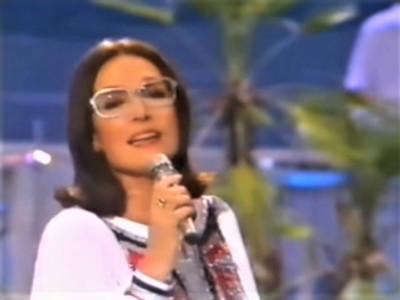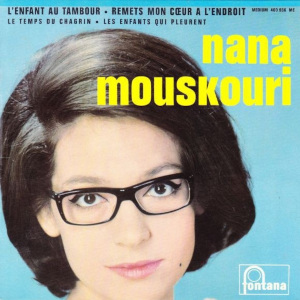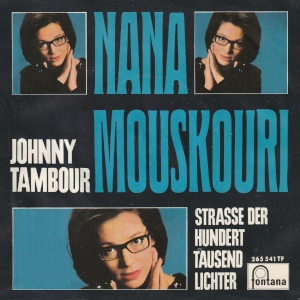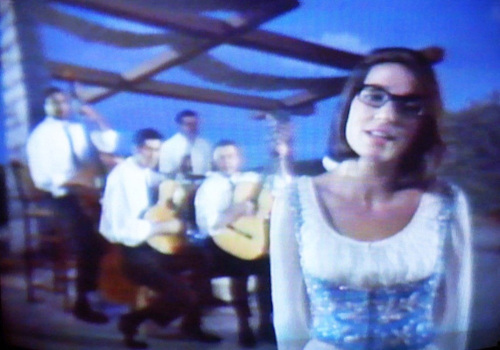
"Strose to stroma"
A popular sirtaki

It is always interesting to highlight certain titles that have marked Nana's career. Each time, we discover new information and we better understand the message conveyed by the lyricists. In her exhaustive repertoire of 1,500 songs, there are eight that she has recorded in five languages. "Strose to stroma" is one of them. Here, let us review its origin, its adaptation, each of the versions (French, Italian, German, Spanish and Greek) as well as Nana's artistic ties with the composer.
ORIGIN The creation of "Strose to stroma sou gia dyo" (its full title) dates back to 1963. It was performed by Grigóris Bithikótsis, a famous singer and lyricist in Greece. The music was signed by Mikis Theodorakis, one of the main composers of the new Greek Song with Manos Hadjidakis and Stavros Xarhakos. He was the one who composed the main theme of the film "Zorba the Greek". Who does not remember this film adaptation directed by Michael Cacoyannis in 1964 which starred Anthony Quinn? It was this film that made sirtaki popular.
|
 |
|
ADAPTATION Nana, on the lookout for new sonorities and melodies to suit her voice, immediately decided to cover one of Theodorakis’s songs in four languages. The musical direction was entrusted to Jacques Denjean with whom she used to work. Iakobos Dentjos, as she called him, was renowned for the beauty of his arrangements and the choice of instruments. This recording is no exception. Like the original, all four versions begin with Zorba's tune. Despite the bouzouki, we feel the sadness of the music which harmonizes with the lyrics. |
REMETS MON COEUR À L’ENDROIT This first recording, entitled "Remets mon coeur à l’endroit", appeared in France in May 1965 on her 14th EP. At the same time, it was paired on a single with "L’enfant au tambour". As the record was reissued annually for the holiday season, this extended its success. The song also came out on various LPs and Nana performed it during her very first tour of Quebec in January and February 1967. With his words, lyricist Jacques Debronckart succeeded in expressing the sadness of the theme. This is why Nana sings that since he left she feels herself getting older and even at night she thinks she recognizes him. And, if we had to rephrase the title, it would be: My heart is broken. Please, come and comfort me.
|
 |
|
IL TUO SORRISO NELLA NOTTE In October 1965, "Il tuo sorriso nella notte" came out as a 45 rpm. As sirtaki was in vogue, it was mentioned on the cover. The song also appeared in the album "In Italia" and Nana performed it on Italian television. Thanks to the bouzouki, a Greek instrument, her version remains the most authentic of all those recorded in Italian. This tells the story of a woman who is ready to run to see the one she loves again. As she says: "Your smile in the night will guide me to you". |
STRASSE DER HUNDERTTAUSEND LICHTER In Germany, at the same time, "Strasse der hunderttausend Lichter" was released on a 45 rpm. A little later, in her second album in German. Nana had the opportunity to perform it on television. And Dutch public was also familiar with this version, which was released on a single and a LP. For those who do not understand the language, here is a summary: The big city is celebrating and the "Street of the hundred thousand lights" makes the night so colorful and beautiful. But I don't have the heart to sing because he went to sea without saying goodbye. |
 |
|
DEVUÉLVEME EL VIVIR The Spanish version was published on an EP in May 1966 under the title "Devuélveme el vivir" (Give me back my life). This is probably the least known of the five versions since it did not come out in Latin America. Nana's recording will be available for the international market in 2008 thanks to her Spanish Integral. As in the other languages, the text deals with the absence of a loved one. That is why she begs him to come, because without him she lives in anguish. If necessary, she's ready to forgive him and apologize. |
STROSE TO STROMA SOU GIA DYO There is no doubt, Nana has recorded it in Greek. Moreover, in 1965, she performed it in one of Dany Kaye's television shows. However, the studio version remains unreleased and in her concerts, it was rather her quartet The Athenians that sang it. It was not until 1982 that "Strose to stroma sou gia dyo" appeared on record. This is a live recording from her show "D’ici et d’ailleurs". As in 1983, in her TV show "Zu meinem Glück gehört Musik", Nana performed it in a medley. At each performance, the musicians vibrate the strings of their bouzouki and for the final, they play Zorba's tune. The text comes down to: Since we met, we have loved each other. "Make your bed for two" so that everything comes back to life. |
 |
A SIXTH VERSION?
It is no exaggeration to believe that there is a sixth version of this song since at that time Nana used to record all her hits in several languages. It would be the one in English. But her record company probably wanted to invest in original songs, like those of Bobby Scott, for example, to make her break through the English-speaking countries. It would therefore be one of her hundreds of unreleased tracks.
|
NANA AND MIKIS Nana Mouskouri and Mikis Theodorakis are two Greeks and two big names in international music. Although they belong to two different worlds, Nana recognizes his talent and all that he has contributed to the music of their country. In her early days, she recorded his work "Epitaphios" with the orchestra of Manos Hadjidakis. And, over the years, she performed many of his songs on stage and on television. Among those recorded, it is "Strose to stroma" that Nana popularized the most. The French version is the most widespread and it is one of her greatest hits of her debut. |
A SONG OF HER COUNTRY
At the spring of 1965, a sirtaki tune gained popularity thanks to a film. By recording it, Nana put her voice at the service of a song from her country. No matter the language in which she sings it, it’s a song to replay. From the first musical notes, one cannot help seeing the film's final scene when Zorba and Basil dance the sirtaki. And as soon as Nana starts singing, we get carried away by her emotion and the words she evokes.